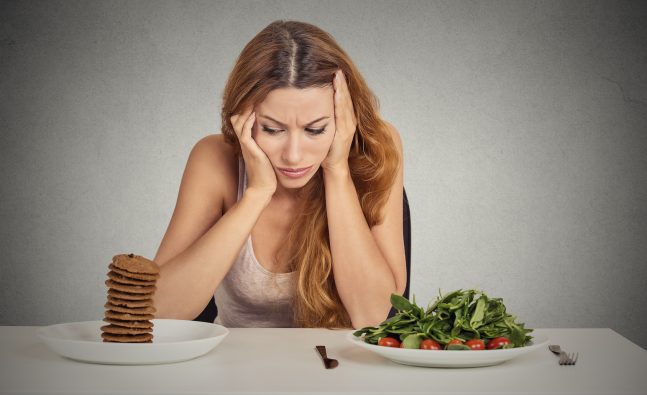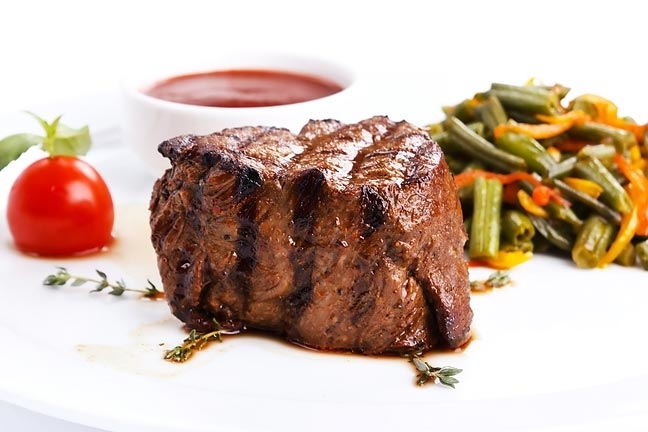Q&A: Will Not Eating ENOUGH Calories Mess with Weight Loss?
The question: "It’s hard to recognize when I’m satisfied, so I end up accidentally overdoing it. But I've heard that eating too few calories can actually make me gain weight, too. Is that true?"
The expert: Amy Shapiro, M.S., R.D., founder of Real Nutrition NYC
The answer: Skimping on your food intake can throw your body for a loop and contribute to weight gain, says Shapiro. “There are clients of mine who come in and aren’t seeing any progress. I tell them they aren’t eating enough, they increase their intake, and they start to lose weight." The reasoning behind this counterintuitive process lies in your body’s aversion to being deprived of food. “When you're not eating enough, you can send your body into starvation mode. Your metabolism slows down because it doesn't know where its next round of calories is coming from,” says Shapiro.
MORE: The 8 Top Weight-Loss Saboteurs, According to Nutritionists
People cite intermittent fasting, which involves alternating days of very minimal food intake with regular eating, as evidence that you can scale way back on calories and still lose weight. It may be true, but that doesn’t mean it’s necessarily the best strategy for you. “With intermittent fasting, you avoid starvation mode because some days you are, in fact, giving your body enough," says Shapiro. "But on the other days, you’re still severely restricting, which I don’t see it being healthy as a long-term option."
The calorie deficit necessary to enter starvation mode depends on various factors and is different for each person—but your body will likely send you some major signals if it’s not getting enough food. “You may feel dizzy, always hit that afternoon slump, get headaches, and of course, feel hungry a lot of the time," says Shapiro. "Generally, you’ll feel lethargic and like you’re not performing at your highest level."
Shapiro says that one time many people tend to skimp on food is after a workout. “People often try to overwork themselves during exercise and then cut calories by not refueling after,” she says. But your body needs those nutrients to rebuild itself after an intense bout of sweating.
MORE: 7 Ways to Snack for Weight Loss
So what if you always find yourself feeling satiated at 1,100 calories a day—less than the 1,200-calorie minimum most experts recommend staying above, even for weight loss? Shapiro says to look at what those calories are made of: “If those 1,100 calories are full of enough fat and protein to get you throughout your day, then that’s enough for your body," she says. "But it’s about feeling legitimately satisfied, not lying to yourself just so you eat less." If you routinely feel satiated while taking in fewer calories than the norm, you shouldn't push yourself to eat more just to reach a number, she says. As long as you’re medically healthy, listen to your body. It’ll tell you when it needs more sustenance.
Shapiro recommends looking beyond calories and focusing more on the composition of your meals. “There are lots of diets out there that put a limit on your calories," she says. "Let’s say 1,600 calories a day. That makes it easy to work around it because you can have 1,600 calories of pizza, chips, and candy. The thing is, those are very different from 1,600 calories of chicken, avocado, and olive oil." Your body burns foods more efficiently when they’re less processed. Focusing on healthy whole foods also helps you avoid the blood sugar spikes and crashes that come with lots of processed diet foods, while delivering slow-burning energy that can make you say sayonara to the dreaded afternoon slump. Sounds like a win-win! Check out some filling foods that will do your body good, and get ready to revamp your grocery list.
MORE: The Ingredient That’s Crucial For Weight Loss
-
Here’s Why Your Weight Goes Up and Down All the Damn Time
Wait, weren't you like four pounds lighter yesterday? Yeah, us too
-
Should you give up wheat?
-
Make your own muesli to cut calories
-
Does Intermittent Fasting Work—and Is It Healthy?
Youve probably heard of people fasting for religious reasons (for exam
-
Why chia seeds are so great for weight loss
-
How My Breakup Motivated Me to Get Fit and Strong
Before: 320 After: 197
- DON'T MISS
- Should I be a certain weight for pregnancy?
- Kim Kardashian Diet
- Lose weight by shopping weekly
- 5 Tips for winter WEIGHT LOSS plus one AMAZING recipe
- 5 Quick TV moves to blast calories
- Avoid deprivation language and aid weight loss
- Healthy ways to indulge in sweet treats
- Top 3 tips for your weight-loss journey
- 10 OVERLOOKED, SMART AND EFFECTIVE WAYS TO LOSE WEIGHT
- Preventing obesity




